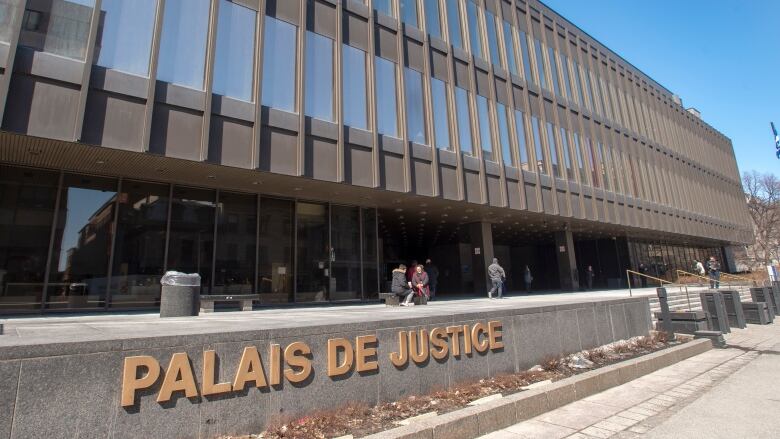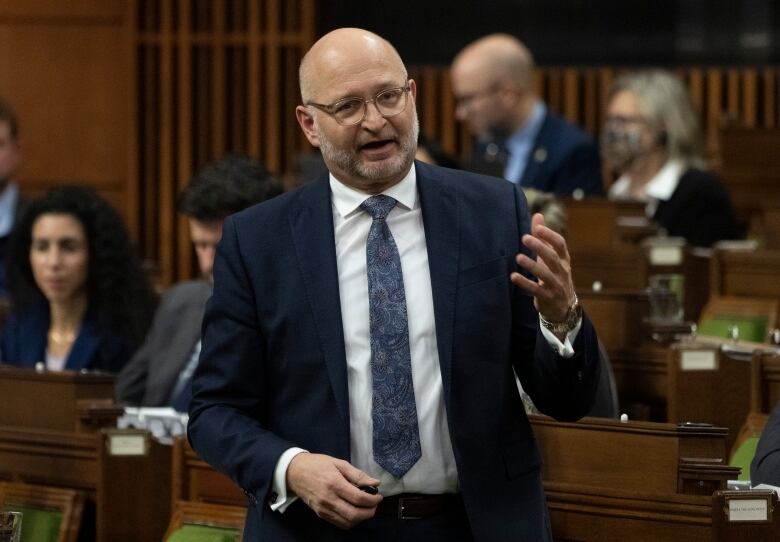'Daily miracles' keeping justice system going, Quebec chief justice warns
Justice minister says pandemic compounded an existing resource issue

The chief justice of the Quebec Superior Court says it is making extraordinary efforts to deal with challenges facing the legal system and her province isn't the only one facing such struggles.
"Daily miracles occur in order to be able to serve the population," Justice Marie-Anne Paquette toldCBC's The House.
People within the system are bending over backwards to rearrange schedules and find creative solutions to address a shortage of judges, she said.
Justice Paquetteused sharper language in a December interview with the Montreal newspaper La Presse she said the system was being held together by "duct tape." She called on the federal government to address judicial vacancies and create new positions.

On Monday, the federal government announced the appointment of three judges to Quebec's Superior Court. Butthat still leaves nine vacancies in Quebec and nearly 90 across the country.
"I don't know if it's reassuring or not, but I think we're not the only ones having to deal with those kinds of challenges," Justice Paquette said in her interview with the CBC.
She insisted that while the system is not on the verge of collapse, it does need to find ways to improve itself quickly.
Elections slowed appointments, minister says
Justice Minister and Attorney General David Lametti told The House he's committed to reducingthe strain on the justice system. He also said several factors have made the problem worse.
"We've come out of a pandemic that created a number of unique challenges to the system, just in addition to, I think, resource questions that have always been there," he told CBC News.
Holding two federal elections over the past four years slowed the appointment process for judges, Lametti said. He also pointed out thatthe government has created over 100 new judicial positions meaning there are more jobs to fill now.

But one Quebec defence lawyer says the justice system has been "chronically underfunded for decades" and is not making effective use of even basic digital technology.
"I'm literally practising today the same way I practised 40 years ago," said Ralph Mastromonaco, a Montreal-area lawyer.
"Every other industry has embraced progress, has embraced information technology, artificial intelligence, to get things done faster and cheaper. But the criminal justice system is impervious to that influence."
Backlog affects ability to seek justice: lawyer
The resource shortfalls, judicial vacanciesand technological backwardness afflicting the justice system lead to delays that have real consequences for ordinary people, Mastromonaco said. He pointed to the special courts set up byQuebec to address cases of sexual assault and conjugal violence.
"There's an avalanche of cases going on, and guess what? They're all being backed up," he said.
And the prospect of waiting years for a verdict could discouragean accused individualfrom mounting a vigorous legal defence, he added.
"What that leads people to do is either not pursue their rights, or to significantly compromise the rights they would otherwise have if they litigated them in court," he said.
At the root of the problem, Mastromonaco said, is the fact that the justice system unlike health care, education or transportation isn't seen by politicians as a policy priority.
"What the pandemic showed me, and every Canadian, is that the government has all the money it needs to do what it wants to do," he said.
"Justice has never been a priority for our government Justice has always been neglected."
WATCH | Calls for changes to Canada's bail rules:
The Liberal government has grappled with many changes to Canada's legal system in its almost eight years in power. It repealedsome mandatory minimum sentences, implementedthe Jordan decision whichlimits the time in which trials must be held after charges are laid and reformed bail rules.
While provinces are responsible for the administration of justice, judicial appointments and a portion of the funding for legal aidflow through the federal government.
Justice Paquetteagreed it can be hardto get policy-makers to pay attention to the needs of the justice system.
"We often fall under the radar," she said."We don't necessarily or instinctively have the sense of how people would suffer from not being able to [have] direct or timely access to justice."
Lametti said he also sometimes feels it's difficult to get sufficient attention paid tothe needs of the system.
"I have to be loud," he said."I try to be loud internally, in particular and I will keep doing that."
Justice Paquette said she hopes her candour convinces people that there's a desire within the justice system itselfto make things better.
"I'm speaking as chief justice, but I can reassure you that all at all levels, all the people involved in providing justice services to the population are aware that the situation is not perfect, that there are points which need and require improvement," she said."We're all sensitive to that."
Clarifications
- This article has been updated to reflect the fact that the federal government is responsible for a portion of the funding for legal aid.Feb 11, 2023 10:28 AM ET













_(720p).jpg)


 OFFICIAL HD MUSIC VIDEO.jpg)
.jpg)



























































































